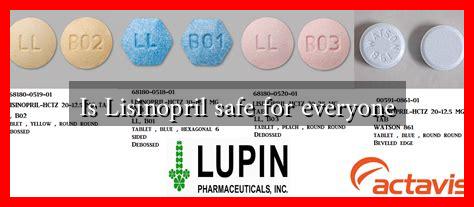-
Table of Contents
Is Lisinopril Safe for Everyone?
Lisinopril is a widely prescribed medication belonging to the class of drugs known as ACE inhibitors (Angiotensin-Converting Enzyme inhibitors). It is primarily used to treat high blood pressure (hypertension) and heart failure, and to improve survival after a heart attack. While it has proven effective for many patients, the question remains: is Lisinopril safe for everyone? This article delves into the safety profile of Lisinopril, its potential side effects, contraindications, and considerations for specific populations.
Understanding Lisinopril
Lisinopril works by relaxing blood vessels, which lowers blood pressure and improves blood flow. It is often prescribed for:
- Hypertension
- Heart failure
- Post-myocardial infarction (heart attack)
According to the American Heart Association, Lisinopril is one of the most commonly prescribed medications for hypertension, with millions of prescriptions written annually. However, its safety is not universal.
Who Should Avoid Lisinopril?
While Lisinopril is effective for many, certain populations should exercise caution or avoid it altogether. These include:
- Pregnant Women: Lisinopril is classified as a Category D medication, meaning it can cause harm to a developing fetus. It is crucial for pregnant women to consult their healthcare provider for alternative treatments.
- Individuals with Kidney Issues: Lisinopril can affect kidney function, particularly in patients with pre-existing kidney disease. Regular monitoring of kidney function is essential for those on this medication.
- Patients with a History of Angioedema: Those who have experienced angioedema (swelling of the deeper layers of the skin) related to previous ACE inhibitor use should avoid Lisinopril, as it can trigger similar reactions.
- Allergic Reactions: Individuals with known allergies to Lisinopril or other ACE inhibitors should not take this medication.
Common Side Effects of Lisinopril
Like any medication, Lisinopril comes with potential side effects. Some of the most common include:
- Dizziness or lightheadedness
- Dry cough
- Fatigue
- Headaches
- Elevated potassium levels (hyperkalemia)
While many patients tolerate Lisinopril well, the dry cough is a particularly notable side effect that can lead some to discontinue use. According to a study published in the Journal of Hypertension, approximately 10-20% of patients experience this side effect.
Considerations for Specific Populations
Some groups may require special consideration when prescribed Lisinopril:
- Older Adults: Age-related changes in kidney function may increase the risk of side effects. Careful monitoring and dosage adjustments may be necessary.
- Patients with Diabetes: Lisinopril can be beneficial for diabetic patients as it may help protect kidney function. However, blood sugar levels should be monitored closely.
- Individuals Taking Other Medications: Lisinopril can interact with diuretics, potassium supplements, and NSAIDs, which may increase the risk of adverse effects.
Conclusion
In summary, while Lisinopril is a highly effective medication for managing hypertension and heart failure, it is not safe for everyone. Pregnant women, individuals with kidney issues, and those with a history of angioedema should avoid this medication. Common side effects, such as dizziness and dry cough, can also impact its tolerability. It is essential for patients to have open discussions with their healthcare providers about their medical history and any potential risks associated with Lisinopril.
Ultimately, the decision to use Lisinopril should be made on a case-by-case basis, considering the individual’s health status and specific needs. Regular monitoring and communication with healthcare professionals can help ensure that patients receive the safest and most effective treatment possible.

